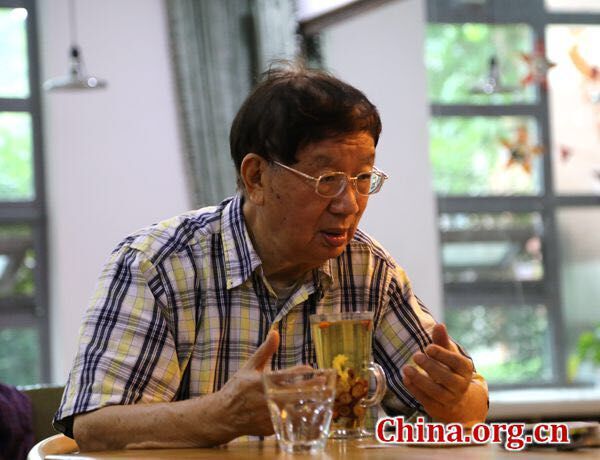Confucian thinker applies 'Yijing' to international politics
- By Zhang Lulu
 0 Comment(s)
0 Comment(s) Print
Print E-mail China.org.cn, June 25, 2017
E-mail China.org.cn, June 25, 2017
 |
|
Professor Chung-ying Cheng takes an interview from China.org.cn in Beijing on June 22. [Photo by Zhang Jiaqi/China.org.cn] |
An eminent New Confucian philosopher has introduced the ancient Chinese book "Yijing" (otherwise known as "I-Ching," the Book of Changes) into the debate about the future direction of international politics.
In his recently published book "Philosophy of the Yijing: New thinking on International Politics," Chinese-American scholar Chung-ying Cheng, a professor of philosophy at the University of Hawaii at Manoa, has brought concepts first appearing during the Western Zhou Dynastic period (1,000-750 B.C.) into the thinking and understanding about modern politics and international affairs.
Yijing and international politics
In an interview with China.org.cn, Cheng said he sees the ancient book as a philosophical expression of change and transformation in the world rather than a divination text as it is usually interpreted, as the book contains conceptual thinking on the cosmos and its development. As it talks about nature, people and civilization, it can readily be used to illuminate politics even in the 21st Century.
He said Yijing contains most of the fundamental principles in the universe, including the relationship between "yin" and "yang," or two opposing forces, which themselves include polarities such as moving and static, weak and strong, hidden and visible, and false and true. When applied to human society, the relations between different countries are also in the network of such changes and interactions, and hence the book can shed light on international politics.
As the development of everything in the world follows the sequence of moving from weak to strong then onto the extreme, before reversing direction known in Chinese as "wujibifan," or "Things transform into their opposites when they reach the extreme," it can help understand the rise and fall of individual nations. This, Cheng said, could be seen in the rise and fall of some of the greatest civilizations and empires in history.
He went on to cite the example of the United States, which he believed has begun to show signs of decline during the accusation-filled presidential election last year. He said that the U.S. has grown from a resource-rich and prosperous country in the 1960s (around the time when the philosopher began attending American universities) to one that faces a dilemma of a slackening manufacturing industry (and a president vowing to restore its former glory) and a necessary piling-on of costs if the president and industries insist on following this route.
In addition, there are various conflicts running rampant in the U.S. today that keep undermining national security and prosperity.
In contrast, Professor Cheng argued, China has been on a path of awakening and a "great leap of its civilization" in the past three decades. The country has not only grown to be the second largest economy in the world, but has also profoundly refreshed itself in the wake of disasters in its modern history and is now on the right path of pursuing harmony not only for itself but also the entire human society.
He went on to argue that there is an ultimate value in the human society, which aims at gradually eliminating the failings of people and society and working towards the good of the people so that good will eventually prevail over evils of society. He said that any country that recognizes this fundamental value and works towards it can continue to prosper.






Go to Forum >>0 Comment(s)